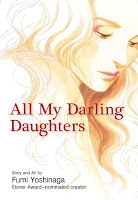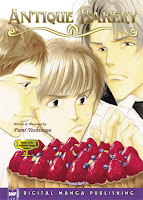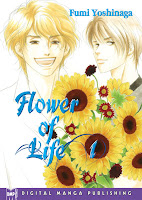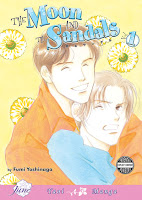My News and Reviews
As promised, this week’s quick takes section explores a bunch of manga by Fumi Yoshinaga. Technically, the Fumi Yoshinaga Manga Moveable Feast ended yesterday, but I’m still going to count this post as part of it (especially since I really meant to write it for last week). Also for the Feast, I posted my review for Ōoku: The Inner Chambers, Volume 3.
Last Thursday marked the one year anniversary of Experiments in Manga. I reflected a bit on this milestone (Random Musings: One Year of Experiments in Manga) and a few of my readers left me some very nice comments that made me very happy. Thanks, guys! I also posted one other review last week for the second volume of the Chinese classic The Journey to the West, as translated by Anthony C. Yu.
It’s been a while since I’ve updated the Resources page, but I’ve added a few blogs: Organization Anti Social Geniuses (Justin occasionally comments here), Joy Kim, Comics-and-More (which has a Manga Monday feature), and Sesho’s Anime and Manga Reviews.
Quick Takes
 All My Darling Daughters by Fumi Yoshinaga. All My Darling Daughters is one of the most recently translated single volume works by Yoshinaga. The manga collects a series of interconnected stories featuring Yukiko, her family, and her friends. The stories examine the characters’ relationships, and while many of them feel rather melancholy, there is happiness to be found as well. Yoshinaga makes me care about the characters and their lives; I want things to work out for the best for them. I am particularly impressed by Yoshinaga’s story-telling in this manga. The stories may be brief, but the narratives are suffused with a remarkable amount of emotional depth and complexity.
All My Darling Daughters by Fumi Yoshinaga. All My Darling Daughters is one of the most recently translated single volume works by Yoshinaga. The manga collects a series of interconnected stories featuring Yukiko, her family, and her friends. The stories examine the characters’ relationships, and while many of them feel rather melancholy, there is happiness to be found as well. Yoshinaga makes me care about the characters and their lives; I want things to work out for the best for them. I am particularly impressed by Yoshinaga’s story-telling in this manga. The stories may be brief, but the narratives are suffused with a remarkable amount of emotional depth and complexity.
 Antique Bakery, Volumes 1-4 by Fumi Yoshinaga. Antique Bakery won a Kodansha Manga Award in 2002 and was nominated for an Eisner in 2007. The pacing of the first volume is rather awkward but soon after Yoshinaga establishes a nice flow for the story. As appropriate for a manga about a bakery, the food has been drawn with just as much loving care as the rest of the characters. The panels can get a bit text heavy from time to time, but seeing as it’s often because of the delicious descriptions of the various pastries, I don’t mind too terribly much. The characters are more complex than they first appear, sometimes in unexpected ways. Working together at the Antique changes them and they each find something there that they needed.
Antique Bakery, Volumes 1-4 by Fumi Yoshinaga. Antique Bakery won a Kodansha Manga Award in 2002 and was nominated for an Eisner in 2007. The pacing of the first volume is rather awkward but soon after Yoshinaga establishes a nice flow for the story. As appropriate for a manga about a bakery, the food has been drawn with just as much loving care as the rest of the characters. The panels can get a bit text heavy from time to time, but seeing as it’s often because of the delicious descriptions of the various pastries, I don’t mind too terribly much. The characters are more complex than they first appear, sometimes in unexpected ways. Working together at the Antique changes them and they each find something there that they needed.
 Flower of Life, Volumes 1-4 by Fumi Yoshinaga. Flower of Life is one of my favorite works by Yoshinaga. To some extent, this surprises me; I’m not generally that big on school comedies. The series doesn’t really have a gimmick—it’s just a story about normal people. Flower of Life is funny and touching and just generally wonderful. It makes my heart ache. One of the complaints I often hear about Yoshinaga is that her characters look so similar to one another. However, in Flower of Life, the cast exhibits a delightful amount of variety and diversity not only in their appearances but in their (often intense) personalities as well. Flower of Life makes me nostalgic for a high school experience that I never had.
Flower of Life, Volumes 1-4 by Fumi Yoshinaga. Flower of Life is one of my favorite works by Yoshinaga. To some extent, this surprises me; I’m not generally that big on school comedies. The series doesn’t really have a gimmick—it’s just a story about normal people. Flower of Life is funny and touching and just generally wonderful. It makes my heart ache. One of the complaints I often hear about Yoshinaga is that her characters look so similar to one another. However, in Flower of Life, the cast exhibits a delightful amount of variety and diversity not only in their appearances but in their (often intense) personalities as well. Flower of Life makes me nostalgic for a high school experience that I never had.
 The Moon and the Sandals, Volumes 1-2 by Fumi Yoshinaga. The very first Yoshinaga manga that I ever read was The Moon and the Sandals. It was also her debut work outside of doujinshi. I originally picked it up when I first started reading boys’ love titles. While it still follows many of the tropes found in the genre, The Moon and the Sandals is much more realistic in its approach than most other boys’ love manga that I’ve read. The series also has sympathetic female characters. The first volume introduces all of the characters while the second volume features quite a bit of sex (a pattern seen in several other works by Yoshinaga). But it’s not just sex for the sake of sex—it’s necessary to show the development of the characters as well as the plot.
The Moon and the Sandals, Volumes 1-2 by Fumi Yoshinaga. The very first Yoshinaga manga that I ever read was The Moon and the Sandals. It was also her debut work outside of doujinshi. I originally picked it up when I first started reading boys’ love titles. While it still follows many of the tropes found in the genre, The Moon and the Sandals is much more realistic in its approach than most other boys’ love manga that I’ve read. The series also has sympathetic female characters. The first volume introduces all of the characters while the second volume features quite a bit of sex (a pattern seen in several other works by Yoshinaga). But it’s not just sex for the sake of sex—it’s necessary to show the development of the characters as well as the plot.
 Tiger & Bunny, Episodes 13-20 directed by Keiichi Satou. I have been enjoying Tiger & Bunny immensely. Sure, the writing can be a bit uneven at times, but I really like the characters. Overall, it’s still a fun show. Some of the earlier episodes were rather goofy, but the anime has gotten more serious and goes to some pretty dark places. Since defeating Jake, Kotetsu and Barnaby’s relationship has become more amicable. I actually sort of miss their more antagonistic banter. But while they’re now generally on good terms with each other they still have some trust issues to work out. Kotetsu is still my favorite character and this set of episodes explores more of his backstory and family history.
Tiger & Bunny, Episodes 13-20 directed by Keiichi Satou. I have been enjoying Tiger & Bunny immensely. Sure, the writing can be a bit uneven at times, but I really like the characters. Overall, it’s still a fun show. Some of the earlier episodes were rather goofy, but the anime has gotten more serious and goes to some pretty dark places. Since defeating Jake, Kotetsu and Barnaby’s relationship has become more amicable. I actually sort of miss their more antagonistic banter. But while they’re now generally on good terms with each other they still have some trust issues to work out. Kotetsu is still my favorite character and this set of episodes explores more of his backstory and family history.
